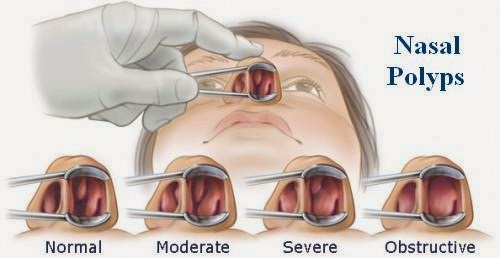Nasal Polyps
Nasal polyps are fleshy swellings that develop in the lining of the nose and paranasal sinuses (air-filled spaces, linked to the nasal cavity). They are non-cancerous growths.
Causes
Nasal polyps grow in inflamed tissue of the nasal mucosa. The mucosa is a very wet layer that helps protect the inside of your nose and sinuses and humidifies the air you breathe. During an infection or allergy-induced irritation, the nasal mucosa becomes swollen and red, and it may produce fluid that drips out. With prolonged irritation, the mucosa may form a polyp. A polyp is a round growth (like a small cyst) that can block nasal passages.
Although some people can develop polyps with no previous nasal problems, there’s often a trigger for developing polyps. These triggers include:
- chronic or recurring sinus infections
- asthma
- allergic rhinitis, or hay fever
- cystic fibrosis
- Churg-Strauss syndrome
- sensitivity to non-steroidal anti-inflammatory drugs (NSAIDs), which is an allergy-like response to anti-inflammatories such as ibuprofen or aspirin
There may be a hereditary tendency for some people to develop polyps. This may be due to the way their genes cause their mucosa to react to inflammation.
Risk factors
Any condition that triggers chronic inflammation in your nasal passages or sinuses, such as infections or allergies, may increase your risk of developing nasal polyps. Conditions often associated with nasal polyps include:
- Asthma,a disease that causes overall airway inflammation and constriction
- Aspirin sensitivitymay cause some people to be more likely to develop nasal polyps
- Allergic fungal sinusitis,an allergy to airborne fungi
- Cystic fibrosis,a genetic disorder that results in the production and secretion of abnormally thick, sticky fluids, including thick mucus from nasal and sinus membranes
- Churg-Strauss syndrome,a rare disease that causes the inflammation of blood vessels
Symptoms
Common signs and symptoms of chronic sinusitis with nasal polyps include:
- A runny nose
- Persistent stuffiness
- Postnasal drip
- Decreased or absent sense of smell
- Loss of sense of taste
- Facial pain or headache
- Pain in your upper teeth
- A sense of pressure over your forehead and face
- Snoring
Complications
Nasal polyps can cause complications because they block normal airflow and fluid drainage, and also because of the chronic inflammation underlying their development. Potential complications include:
- Obstructive sleep apnea.In this potentially serious condition, you stop and start breathing frequently during sleep.
- Asthma flare-ups.Chronic rhinosinusitis can aggravate asthma.
- Sinus infections.Nasal polyps can make you more susceptible to sinus infections that recur often or become chronic.
Homoeopathic Treatment
Homeopathy is strongly recommended for management of nasal polyps, especially when they are small in size. Timely administered homeopathy medicines help avoid surgery and its inherent complications. Moreover, it is very common for the condition to recur even after surgery. Homeopathy also has preventive role to offer, by which chance of recurrence is minimized.

